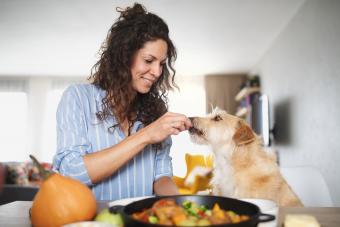
Most dogs love human food and tasty drinks. It's normal to be tempted to share food with your dog, especially when they're sitting intently, begging for a bite or a sip. Unfortunately, dogs can't drink most of the beverages humans enjoy - including coffee, tea, milk, and alcohol, among others - because their bodies don't process fluids the same way ours do. You need to keep these away from your dog. Water is the most critical fluid to provide to your dog. Be sure to have fresh, clean water available for your dog at all times. However, there are a couple alternative beverage options you can offer your dog.

Skip Coffee and Anything with Caffeine
While you may love your cup of Joe, it's not the best thing for your dog. The simple answer is no; dogs should not drink coffee. The long answer is that some dogs might be able to tolerate a small amount of caffeine, but that doesn't mean you should give them coffee (or coffee beans) as a treat.
Dogs can't metabolize caffeine as well as we can, which means it takes longer for their bodies to get rid of the stimulant. If your dog drinks too much caffeine regularly, they could develop serious health problems, including:

- Vomiting and diarrhea
- Increased heart rate
- Seizures or tremors
- Heart arrhythmia (abnormal heart rhythm)
Also, many people add sugar and milk to their coffee, and both are not good for dogs. In general, sugary drinks are not good for dogs, so avoid offering anything with high levels of sugar in it to your dog.
Can Dogs Drink Tea?
Dogs maybe be able to drink some types of tea without showing any negative health effects, but it's not recommended because of tea's caffeine content. In humans, caffeine is an addictive stimulant that increases alertness and brain activity. It also increases the heart rate and blood pressure. In general, unless you have specific veterinary guidance, do not let your dog drink tea.
The effects of caffeine on humans are generally mild, but they can be dangerous for your dog. Dogs don't have the enzymes they need to break down caffeine, so it builds up in their bodies and causes problems, including tremors, twitching muscles, and seizures. Caffeine also affects dogs' nervous systems in other ways, such as insomnia and hyperactivity.
Unfortunately, even though herbal teas present some potential benefits to our dogs, the risks often outweigh the benefits. Unless your holistic veterinarian has specifically recommended a certain tea type, you shouldn't offer your pup a sip of your cup. If there's a particular ingredient you're interested in offering your dog, talk to your veterinarian about whether they should have it and, if so, how it can be offered.
No Cow's Milk
Dogs shouldn't drink cow's milk. The problem is that most dogs don't produce the enzyme required to digest lactose, so they end up with diarrhea as a result. If your dog has this problem, you should avoid giving them milk altogether. But, if you're looking for an occasional treat to help boost your dog's immune system, raw goat's milk is a good option.
The benefits of raw goat's milk include:
- Contains lactase to help break down milk, improving digestion
- Smaller fat particles make it easier to digest
- Packed with probiotics and enzymes
- Contains fatty acids that reduce cholesterol
- Increases sensitivity to insulin, reducing the risk of diabetes
- Aids in preventing leaky gut syndrome
- High in vitamins and minerals, including calcium, B12, iron, selenium, and zinc
- Helps maintain pH levels in your dog's digestive system
Lemonade Is Too Acidic
Your dog shouldn't drink lemonade. Like you, your dog can experience acid reflux, and their system is a bit more sensitive than yours. The symptoms of acid reflux in dogs can vary from mild to severe, depending on the cause and severity of the condition. Acid reflux is caused by stomach acid backing up into the esophagus. The symptoms of acid reflux are related to this backup of stomach acid, which causes damage to the lining of the esophagus. Common signs include:
- Excessive drooling
- Coughing
- Dry heaving
- Vomiting (may contain blood)
- Excessive panting or shortness of breath
To cover up the acidity of lemonade, most lemonades have a significant amount of added sugar. Your dog's blood sugar levels can spike if they drink lemonade, making them more susceptible to negative health conditions, such as diabetes. Your dog doesn't need to acidity or sugar in lemonade, so skip this beverage.
Don't Let Your Dog Drink Alcohol
No, dogs cannot drink beer, wine, or any other alcoholic beverages. Dogs metabolize alcohol differently than humans do, which means they can't process it at all. For example, when you drink a beer, you might feel relaxed and happy, or even sleepy. Your dog will likely feel the opposite: dizzy and disoriented.

In addition to being a toxin that might make your dog sick, alcohol can be downright dangerous for them in other ways. For example, drinking large amounts of beer or wine could cause liver damage in your pet. It could also cause seizures, leading to death if left untreated.
Wine is especially dangerous for dogs, because it also contains tartaric acid, which has recently been identified as the toxic chemical in grapes that can make dogs very ill, or even lead to their death. Because wine has both higher alcohol content than beer, and because it is made up of other dangerous compounds that can harm your dog, do not let your dog try it.
Wine and beer are two drinks your dog may be attracted to, due to their smell. Hard alcohol is less likely to attract your dog's attention, because of it's strong smell, but to be safe, never give your dog the chance to try it. If you walk away from your drink, make sure it's somewhere your dog can't get to. If your dog does get ahold of your drink, call the Pet Poison Helpline or your veterinarian.
Provide Plenty of Water
Water is the only thing your dog should be drinking regularly. Why? Because water keeps dogs hydrated and provides them with essential vitamins and minerals, which help keep their bodies healthy. Water helps keep your dog's digestion regular by stimulating the digestive tract to move food through the intestines. It also helps remove waste during digestion.
Water keeps muscles flexible so dogs can move easily, leaving them less likely to become strained or overworked during exercise or playtime outdoors. It also helps reduce stiffness in older dogs who may have joint issues from arthritis or other age-related problems like poor circulation in their paws, which can lead to painful sores.
Water is essential for a healthy brain. It provides oxygen needed by nerve tissue throughout your dog's body. Water is the stuff of life. Give your dog unrestricted access to as much water as they like. If you're worried that your dog is drinking too much water, don't take it away. Instead, try to figure out what's causing your dog's excessive thirst, and address the underlying issue.
Adding Bone Broth to Water
If you want to give your dog a tasty treat that's good for them to drink, consider adding some bone broth to their water. Adding bone broth to your dog's water is an easy way to improve your dog's health and nutrition. As with people, the best way to ensure a long and healthy life for your dog is to eat a lot of whole foods. Bone broth contains all the nutrients that are naturally found in bones, including:
- Calcium
- Phosphorus
- Collagen
- Glucosamine
- Magnesium
- Sulfur
- Silicon
For dogs that are used to drinking plain water from a bowl, adding bone broth will make their water more appealing by boosting its flavor while also adding essential nutrients. This could increase their water intake - which can be a great thing for dogs who aren't drinking enough water. Plus, bone broth is easy to make from scratch if you want to cook it yourself, rather than purchase it from the store. Whether you prep bone broth yourself or buy it, make sure it contains no added sodium.
Play it Safe
Even if your dog tried some of the above beverages in the past and has tolerated them, that doesn't mean they are healthy for your dog to consume. Play it on the safe side and keep your dog as healthy as possible. Stick to offering your dog water and the occasional sip of raw goat's milk. If you want to make their water tastier, you can add bone broth, knowing your dog is not only receiving much-needed hydration, but also nutrients that help their body function properly.







